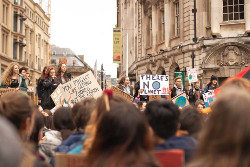

Alongside our partners and driven by our values, the Stanley Center is committed to a peaceful, equitable, and livable climate future with global temperatures safely limited to 1.5°C.
Climate change has exacerbated food, health, energy, and economic crises in every corner of the planet with compounding effect on inequity, division, and conflict. We believe that ambitious climate action—done right—will lead to a better world than we found it.
The kind of climate action we uphold includes and centers the most marginalized, considers only safe and just solutions that redress and repair systemic harms, and accounts for the consequences of global temperature rise.
Transformational policy is our collective, moral obligation to the people, societies, and economies of the most climate-vulnerable places on Earth—and to future generations. The time for systemic and collective mitigation efforts and adequate adaptation approaches is now.
Our overall strategy emphasizes the flexibility to do what makes sense in a complex field with many actors who share a rightful sense of urgency. Alongside new and existing partners, the Stanley Center amplifies policy ideas among stakeholders and catalyzes novel ideas to the proof-of-concept phase. Co-creating multi-level coalitions and exploring intersections of policy pathways also embody our theory of change.
In these final days of coal, oil, and gas, the opportunity to redesign systems toward carbon neutrality is clear—and the opportunity to bring justice and inclusivity to the transition is equally important. We will continue to work with civil society, the private sector, and governments at all levels in that pursuit.
With the Paris Agreement entering its implementation phase, the UNFCCC process and COPs must become more than a forum for negotiation—they must prove capacity for increasingly ambitious policy implementation and collective action to address impacts. Alongside non-state and subnational actors, we seek to catalyze that shift.
From the private sector to civil society to governments at all levels, all actors need to further the kinds of critical changes necessary to limit temperature rise. We develop the conversations to identify and drive action.
For policy progress to be truly transformative, institutions other than the UNFCCC must become enablers of ambitious climate action. We create space and opportunity for the barriers to be identified and policy solutions to be advanced.
The perception of climate change as a threat multiplier to peace and security serves a limited, narrow, and defensive purpose. By championing climate action as a force multiplier for good, we will demonstrate how just and equitable climate solutions can lead to more peaceful and secure futures for all.
Follow our unfolding conversations
Climate Change
The Geopolitics of the Energy Transition and Opportunities for International CooperationClimate Change
Climate Change and Systemic Environmental RacismClimate Change
The Four Ds of Oil’s Just TransitionSee new and ongoing collaborations
June 17-18, 2024 | Climate Change
Workshop: Renewable Energy and Peace. Bringing together policies and practicesDecember 8, 2023 | Climate Change
Opportunities for Fossil Fuel Importers to Cooperate on the Energy TransitionDecember 6, 2023 | Climate Change
Alliances for Climate Action Strategy Session and Dinner at COP28
Mitigating climate change is not only important for global peace and security, but key to fulfilling our moral imperative to protect those communities most at risk. As part of our core values, the Stanley Center recognizes the collective responsibility of all people to one another, to our planet, and to building a just and sustainable future.
For these reasons, the Stanley Center has pledged to eliminate investments in fossil fuels from the endowment that supports our work. We encourage other organizations to DivestInvest.
Follow us on Twitter (@StanleyConnect) or contact a member of our team working to mitigate climate change.